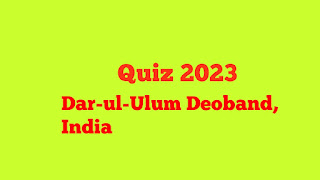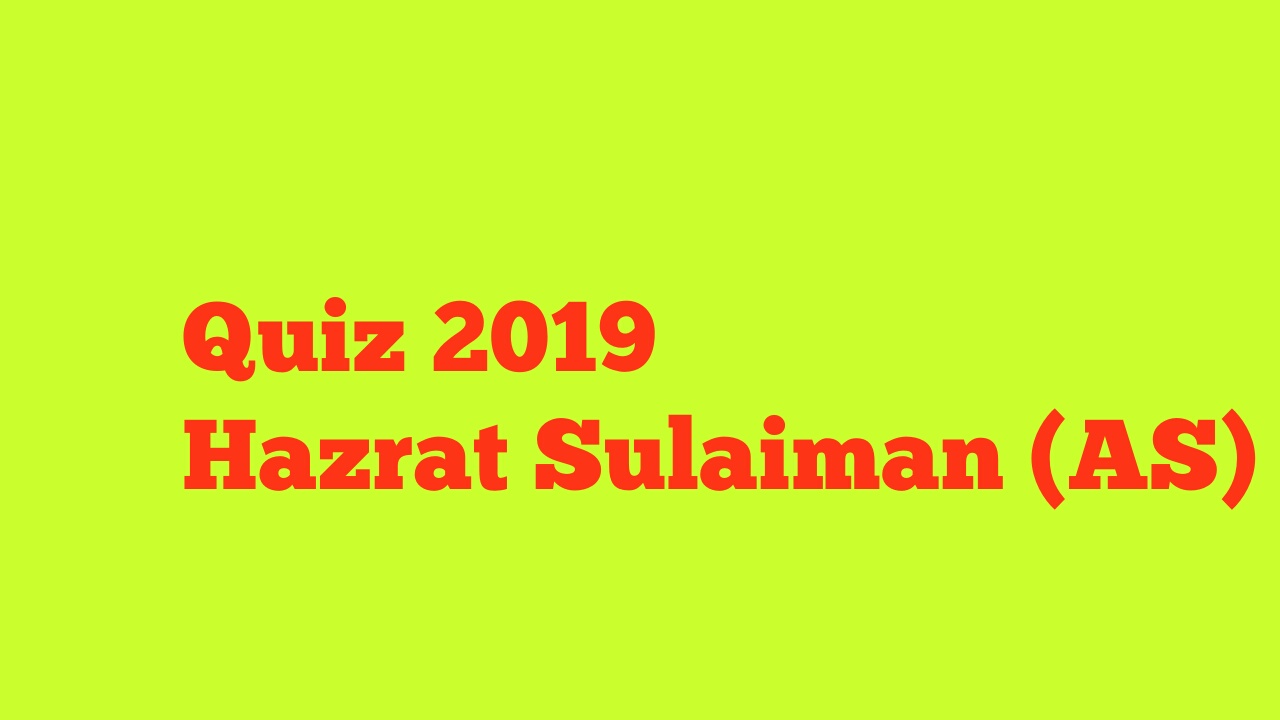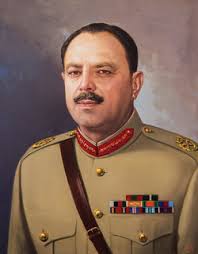Answers of Quiz 2023 (Dar-ul-Ulum Deoband, India)
1. 31 May 1866
2. Muhammad Qasim Nanotvi, Rasheed Ahmed Gangohi and 'Abid Husaiyn
3. At Deoband, a town in Saharanpur district, Uttar Pradesh, India
4. Mufti Abul Qasim Nomani
5. Deobandi is a revivalist movement within Sunni Islam. It is centered in India, Pakistan, Afghanistan, and Bangladesh, has recently spread to the United Kingdom, and has a presence in South Africa.
6. Hanafi school of thought
7. Yes it is correct
8. Bangladesh
9. India
10. Tablighi Jamaat, a non political Muslim missionary organisation, began as an offshoot of the Deobandi movement. Its inception is believed to be a response to Hindu reform movements, which were considered a threat to vulnerable and non-practicing Muslims. It gradually expanded from a local to a national organisation, and finally to a transnational movement with followers in over 150 countries.
11. The Bishwa Ijtema (meaning Global Congregation) is an annual gathering of Muslims in Tongi, by the banks of the River Turag, in the outskirts of Dhaka, Bangladesh. It is one of the largest peaceful gatherings in the world. The Ijtema is a prayer meeting spread over three days, during which attending devotees perform daily prayers while listening to scholars reciting and explaining verses from the Quran. It culminates in the Akheri Munajat, or the Final Prayer, in which millions of devotees raise their hands in front of Allah (God) and pray for world peace. The Ijtema is considered a demonstration of Muslim unity, solidarity, mutual love and respect and an opportunity to reiterate their commitment to Islamic values.
12. Sipah-e-Sahaba Pakistan (SSP) is a banned Pakistani militant organization. Established in the early 1980s in Jhang by the militant leader Haq Nawaz Jhangvi, its stated goal is primarily to deter major Shiite influence in Pakistan in the wake of the Iranian Revolution.
13. Lashkar-e-Jhangvi (LJ) (Army of Jhangvi) is a militant organization. Formed in 1996, it has operated in Pakistan since Sipah-e-Sahaba (SSP). Riaz Basra broke away from the SSP over differences with his seniors. The group is considered a terrorist group by Pakistan and the United States, and continues to be involved in attacks on Shi'a civilians and protectors of them. Lashkar-e-Jhangvi is predominantly Punjabi. The group has been labelled by intelligence officials in Pakistan as a major security threat.
14. The Taliban ("students"), alternative spelling Taleban, is an Islamic fundamentalist political movement in Afghanistan. It spread into Afghanistan and formed a government, ruling as the Islamic Emirate of Afghanistan from September 1996 until December 2001, with Kandahar as the capital. While in power, it enforced its strict interpretation of Sharia law. While many leading Muslims and Islamic scholars have been highly critical of the Taliban's interpretations of Islamic law, the Darul Uloom Deoband has consistently supported the Taliban in Afghanistan, including their 2001 destruction of the Buddhas of Bamiyan, and the majority of the Taliban's leaders were influenced by Deobandi fundamentalism. Pashtunwali, the Pashtun tribal code, also played a significant role in the Taliban's legislation. The Taliban were condemned internationally for their brutal treatment of women.
15. Tehrik-i-Taliban Pakistan (the TTP), alternatively referred to as the Pakistani Taliban, is an umbrella organization of various Islamist militant groups based in the northwestern Federally Administered Tribal Areas along the Afghan border in Pakistan. In December 2007 about 13 groups united under the leadership of Baitullah Mehsud to form the Tehrik-i-Taliban Pakistan. Among the Tehrik-i-Taliban Pakistan's stated objectives are resistance against the Pakistani state, enforcement of their interpretation of sharia and a plan to unite against NATO-led forces in Afghanistan. The TTP is not directly affiliated with the Afghan Taliban movement led by Mullah Omar, with both groups differing greatly in their histories, strategic goals and interests although they both share a primarily Deobandi interpretation of Islam and are predominantly Pashtun.
16. Jamiat Ulema-e-Islam (JUI) is a Deobandi organization, part of the Deobandi movement. The JUI formed when members broke from the Jamiat Ulema-e-Hind in 1945 after that organization backed the Indian National Congress against the Muslim League's lobby for a separate Pakistan. The first president of the JUI was Shabbir Ahmad Usmani.
17. Majlis-e-Ahrar-e-Islam, also known in short as Ahrar, was a conservative Deobandi political party in the Indian subcontinent during the British Raj, founded December 29, 1929 at Lahore. Chaudhry Afzal Haq, Syed Ata Ullah Shah Bukhari, Habib-ur-Rehman Ludhianvi, Mazhar Ali Azhar, Zafar Ali Khan and Dawood Ghaznavi were the founder's of the party. The Ahrar was composed of Indian Muslims disillusioned by the Khilafat Movement, which cleaved closer to the Congress Party. The party was associated with opposition to Muhammad Ali Jinnah and establishment of an independent Pakistan as well as persecution of the Ahmadiyya Muslim Community. After the independence of Pakistan in 1947, Majlis-e-Ahrar divided in two parts. Now, Majlis-e-Ahrar-e-Islam is working for the sake of Muhammad, nifaaz Hakomat-e-illahiyya and Khidmat-e-Khalq. In Pakistan, Ahrar secretariat is in Lahore and in India it is based in Ludhiana.
18. Maulana Tariq Jameel, is a Pakistani religious and Islamic scholar, preacher, and public speaker from Tulamba near Mian Channu in Khanewal, Punjab, Pakistan.
19. Maulana Muhammad Ilyas Kandhlawi
20. 152 years
2. Muhammad Qasim Nanotvi, Rasheed Ahmed Gangohi and 'Abid Husaiyn
3. At Deoband, a town in Saharanpur district, Uttar Pradesh, India
4. Mufti Abul Qasim Nomani
5. Deobandi is a revivalist movement within Sunni Islam. It is centered in India, Pakistan, Afghanistan, and Bangladesh, has recently spread to the United Kingdom, and has a presence in South Africa.
6. Hanafi school of thought
7. Yes it is correct
8. Bangladesh
9. India
10. Tablighi Jamaat, a non political Muslim missionary organisation, began as an offshoot of the Deobandi movement. Its inception is believed to be a response to Hindu reform movements, which were considered a threat to vulnerable and non-practicing Muslims. It gradually expanded from a local to a national organisation, and finally to a transnational movement with followers in over 150 countries.
11. The Bishwa Ijtema (meaning Global Congregation) is an annual gathering of Muslims in Tongi, by the banks of the River Turag, in the outskirts of Dhaka, Bangladesh. It is one of the largest peaceful gatherings in the world. The Ijtema is a prayer meeting spread over three days, during which attending devotees perform daily prayers while listening to scholars reciting and explaining verses from the Quran. It culminates in the Akheri Munajat, or the Final Prayer, in which millions of devotees raise their hands in front of Allah (God) and pray for world peace. The Ijtema is considered a demonstration of Muslim unity, solidarity, mutual love and respect and an opportunity to reiterate their commitment to Islamic values.
12. Sipah-e-Sahaba Pakistan (SSP) is a banned Pakistani militant organization. Established in the early 1980s in Jhang by the militant leader Haq Nawaz Jhangvi, its stated goal is primarily to deter major Shiite influence in Pakistan in the wake of the Iranian Revolution.
13. Lashkar-e-Jhangvi (LJ) (Army of Jhangvi) is a militant organization. Formed in 1996, it has operated in Pakistan since Sipah-e-Sahaba (SSP). Riaz Basra broke away from the SSP over differences with his seniors. The group is considered a terrorist group by Pakistan and the United States, and continues to be involved in attacks on Shi'a civilians and protectors of them. Lashkar-e-Jhangvi is predominantly Punjabi. The group has been labelled by intelligence officials in Pakistan as a major security threat.
14. The Taliban ("students"), alternative spelling Taleban, is an Islamic fundamentalist political movement in Afghanistan. It spread into Afghanistan and formed a government, ruling as the Islamic Emirate of Afghanistan from September 1996 until December 2001, with Kandahar as the capital. While in power, it enforced its strict interpretation of Sharia law. While many leading Muslims and Islamic scholars have been highly critical of the Taliban's interpretations of Islamic law, the Darul Uloom Deoband has consistently supported the Taliban in Afghanistan, including their 2001 destruction of the Buddhas of Bamiyan, and the majority of the Taliban's leaders were influenced by Deobandi fundamentalism. Pashtunwali, the Pashtun tribal code, also played a significant role in the Taliban's legislation. The Taliban were condemned internationally for their brutal treatment of women.
15. Tehrik-i-Taliban Pakistan (the TTP), alternatively referred to as the Pakistani Taliban, is an umbrella organization of various Islamist militant groups based in the northwestern Federally Administered Tribal Areas along the Afghan border in Pakistan. In December 2007 about 13 groups united under the leadership of Baitullah Mehsud to form the Tehrik-i-Taliban Pakistan. Among the Tehrik-i-Taliban Pakistan's stated objectives are resistance against the Pakistani state, enforcement of their interpretation of sharia and a plan to unite against NATO-led forces in Afghanistan. The TTP is not directly affiliated with the Afghan Taliban movement led by Mullah Omar, with both groups differing greatly in their histories, strategic goals and interests although they both share a primarily Deobandi interpretation of Islam and are predominantly Pashtun.
16. Jamiat Ulema-e-Islam (JUI) is a Deobandi organization, part of the Deobandi movement. The JUI formed when members broke from the Jamiat Ulema-e-Hind in 1945 after that organization backed the Indian National Congress against the Muslim League's lobby for a separate Pakistan. The first president of the JUI was Shabbir Ahmad Usmani.
17. Majlis-e-Ahrar-e-Islam, also known in short as Ahrar, was a conservative Deobandi political party in the Indian subcontinent during the British Raj, founded December 29, 1929 at Lahore. Chaudhry Afzal Haq, Syed Ata Ullah Shah Bukhari, Habib-ur-Rehman Ludhianvi, Mazhar Ali Azhar, Zafar Ali Khan and Dawood Ghaznavi were the founder's of the party. The Ahrar was composed of Indian Muslims disillusioned by the Khilafat Movement, which cleaved closer to the Congress Party. The party was associated with opposition to Muhammad Ali Jinnah and establishment of an independent Pakistan as well as persecution of the Ahmadiyya Muslim Community. After the independence of Pakistan in 1947, Majlis-e-Ahrar divided in two parts. Now, Majlis-e-Ahrar-e-Islam is working for the sake of Muhammad, nifaaz Hakomat-e-illahiyya and Khidmat-e-Khalq. In Pakistan, Ahrar secretariat is in Lahore and in India it is based in Ludhiana.
18. Maulana Tariq Jameel, is a Pakistani religious and Islamic scholar, preacher, and public speaker from Tulamba near Mian Channu in Khanewal, Punjab, Pakistan.
19. Maulana Muhammad Ilyas Kandhlawi
20. 152 years



Comments
Post a Comment